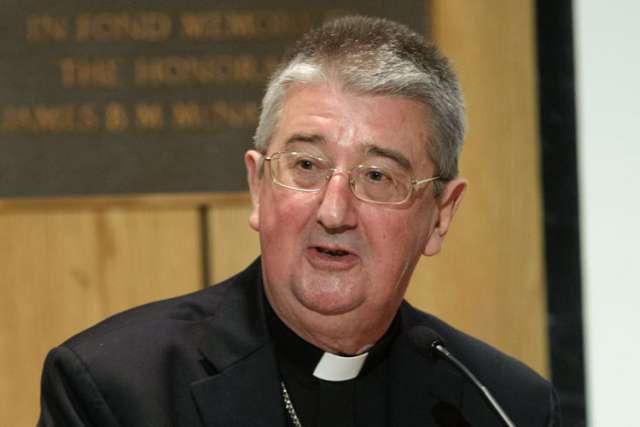The inquiry comes amid increased disquiet about some of the reporting of the original story of St. Mary's Home in Tuam, run by the Bon Secours congregation of nuns.
In May, local historian Catherine Corless revealed her research, which found that between 1925 and 1961, 976 infants died in the home for unmarried mothers and their children. She had found no evidence that they were buried in local cemeteries and instead believed that the children may have been buried in a common grave on the site.
However, several media outlets began reporting that the children had been "dumped" in a disused septic tank on the site. Within days, the international media was gripped by the story — much of which turned out to be factually inaccurate.
Dublin Archbishop Diarmuid Martin has expressed support for a judicial inquiry.
"The only way we will come out of this particular period of our history is when the truth comes out," he said.
"The indications are that if something happened in Tuam, it probably happened in other mother and baby homes around the country. That is why I believe that we need a full-bodied investigation. There is no point in investigating just what happened in Tuam and then next year finding out more," Martin said.
Charlie Flanagan, minister for children and youth affairs, said the inquiry will look at all homes.
"It's time for sensitivity rather than sensationalism," he said.
Corless, who lives near the site of the home, has criticized the coverage of her research.
"I never used that word 'dumped,' ” she insisted. "I never said to anyone that 800 bodies were dumped in a septic tank. That did not come from me at any point. They are not my words."
The Associated Press also falsely reported that the children were upbaptized and that Catholic teaching dictated that children born out of wedlock should not be baptized. In a correction issued June 20, AP admitted that it had gotten many facts wrong about the story.
"In stories published June 3 and June 8 about young children buried in unmarked graves after dying at a former Irish orphanage for the children of unwed mothers, The Associated Press incorrectly reported that the children had not received Roman Catholic baptisms; documents show that many children at the orphanage were baptized.
"The AP also incorrectly reported that Catholic teaching at the time was to deny baptism and Christian burial to the children of unwed mothers; although that may have occurred in practice at times, it was not Church teaching. In addition, in the June 3 story, the AP quoted a researcher who said she believed that most of the remains of children who died there were interred in a disused septic tank; the researcher has since clarified that without excavation and forensic analysis it is impossible to know how many sets of remains the tank contains, if any. The June 3 story also contained an incorrect reference to the year that the orphanage opened; it was 1925, not 1926."
In a June 23 report, AP went further, saying that "revelations this month that nuns had buried nearly 800 infants and young children in unmarked graves at an Irish orphanage during the last century caused stark headlines and stirred strong emotions and calls for investigation.
"Since then, however, a more sober picture has emerged that exposes how many of those headlines were wrong," the AP said.
AP conceded that "the case of the Tuam 'mother and baby home' offers a study in how exaggeration can multiply in the news media, embellishing occurrences that should have been gripping enough on their own."
Corless, who lives near the site of the Tuam mother and baby home, has been working for several years on records associated with the institution. The children's names, ages, places of birth and causes of death were recorded. The average number of deaths during the 36-year period was just over 22 a year. The information recorded on these state-issued certificates shows that the children died variously of tuberculosis, convulsions, measles, whooping cough, influenza, bronchitis and meningitis, among other illnesses.
Infant mortality in Ireland in the 1930s and 1940s was in the region of 70 per 1,000 or seven per cent, as high as countries in sub-Saharan Africa have now. For much of the period covered, mortality rates among so-called "illegitimate children" was five times that of the rest of the population.
David Quinn, director of the Dublin-based religious think-tank The Iona Institute, said, "There was a rush to believe the worst about the nuns and about Catholic Ireland."
"The fact that some terrible things did happen in Church-run institutions is no excuse whatsoever. Journalists are supposed to check facts. That is absolutely basic to journalism. Mistakes will obviously be made from time to time, but when a whole plethora of various serious mistakes are made in the one story, and I'm not just talking about AP here, then we've got a problem," he said.
Quinn said some media even reported that the nuns were starving the babies and that many had died of malnutrition.
"Only a handful died of malnutrition. Those that did may well have arrived in the home already severely malnourished or had badly malnourished mothers," he said.
"The rest died of highly infectious diseases like measles, which would often kill a dozen babies in the space of a fortnight. From the late 1940s when antibiotics came on stream, the death rate plunged," Quinn said.


